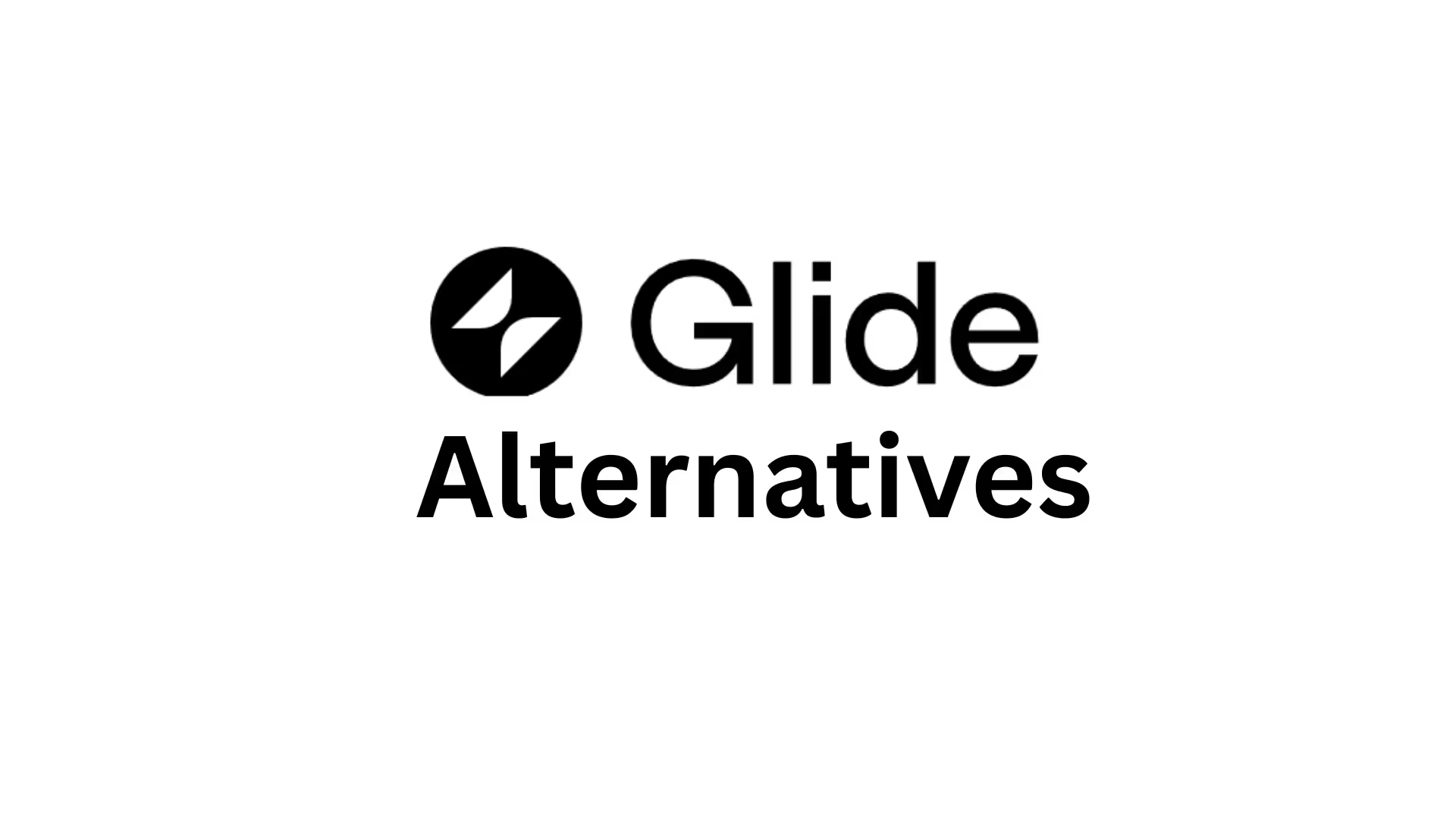
Want to build apps by simply describing what you need instead of dragging and dropping components? You're looking for AI prompt-based app builders that understand natural language and generate functional applications instantly.
Glide AI has popularized this approach, but the market now offers specialized alternatives with unique strengths. Some excel at mobile apps, others at workflow automation, and a few provide component-based architecture that eliminates code vulnerabilities entirely.
This guide examines eight leading Glide AI alternatives, comparing their prompt-based building capabilities, AI features, deployment options, and pricing to help you choose the right platform.
Traditional no-code platforms require manually dragging components, configuring settings, and building logic through visual interfaces. AI prompt-based builders work differently—you describe your requirements conversationally, and artificial intelligence generates the application structure.
Conversational development lets you type requests like "create an employee attendance app with GPS tracking" or upload documents containing requirements. The AI interprets your needs and builds the foundation automatically.
Iteration through dialogue means refining your app by chatting with the AI. Instead of clicking through menus, you simply say "add WhatsApp notifications" or "change the date field to a dropdown" and watch changes happen instantly.
Multiple approaches exist in the market. Some platforms generate actual code you can export, while others use pre-built professional components arranged by AI. The component-based approach eliminates security vulnerabilities since professional developers maintain all underlying code.
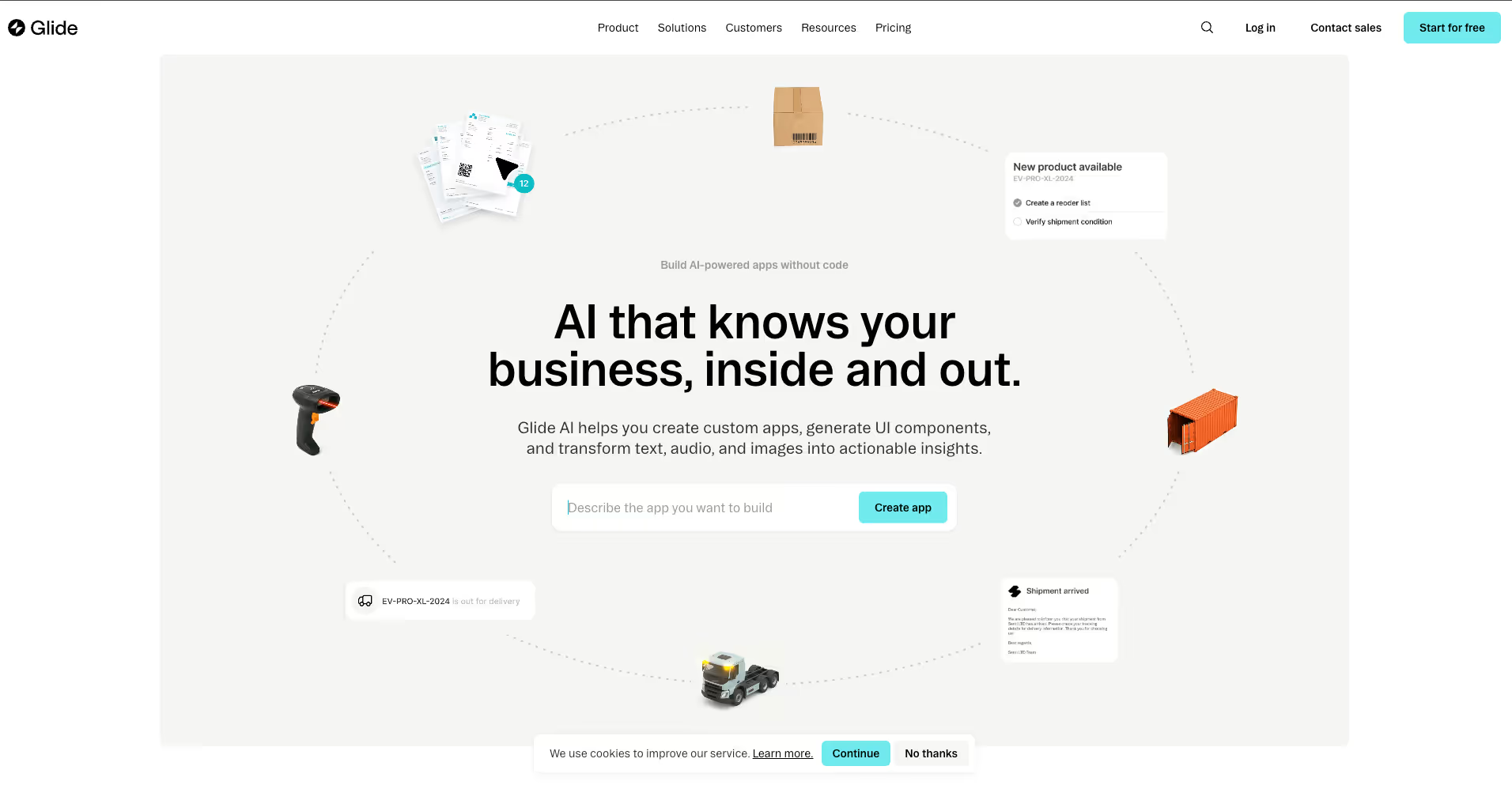
Several factors drive teams to explore options beyond Glide AI for prompt-based app building.
Progressive web app limitations restrict deployment options. Glide creates PWAs that can't publish to Apple App Store or Google Play Store, limiting discoverability and user adoption for customer-facing applications.
Pricing structure based on per-user costs escalates quickly for growing businesses or public-facing apps. Teams need predictable pricing that aligns with business growth without unexpected spikes.
Data source restrictions primarily favor spreadsheets and Glide Tables. Organizations with existing databases or complex data requirements often find these limitations constraining for enterprise applications.
Customization boundaries within template-based layouts prevent pixel-perfect designs or unique branding requirements. Businesses needing distinctive interfaces seek more flexible alternatives.
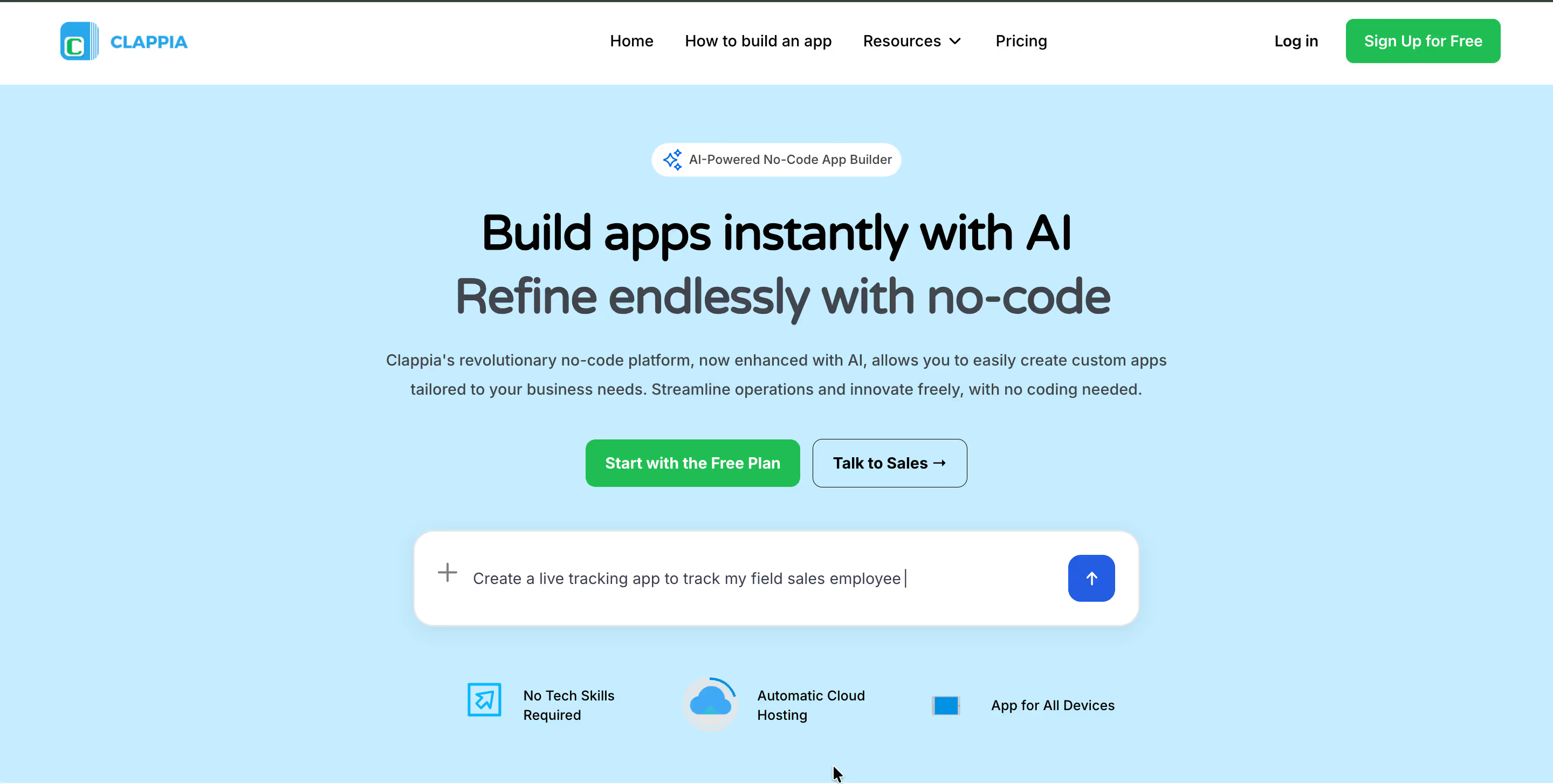
Clappia AI takes a fundamentally different approach from Glide and most prompt-based builders. Instead of generating code, Clappia AI arranges 100+ professionally developed components based on your natural language descriptions or uploaded documents.
How It Works:
You describe your app requirements conversationally—"create an employee field sales tracking app with live GPS location"—or upload PRD/BRD documents. Clappia AI analyzes your needs and proposes an app structure showing fields, sections, and workflows. You confirm or request modifications through chat before the AI builds your application.
Key Differentiators:
Component-based architecture eliminates code generation entirely. Professional developers maintain all 100+ field types and workflow nodes, handling security patches, bug fixes, and AWS infrastructure automatically. You never see or worry about code vulnerabilities.
Native mobile deployment publishes apps directly to Apple App Store and Google Play Store. Unlike Glide's progressive web apps, users download fully native applications with offline capabilities and device-specific features.
Advanced field operations include GPS location tracking with geofencing, photo and video capture, NFC support, barcode scanning, and electronic signatures—features designed specifically for field teams and operational workflows.
Comprehensive automation through AI workflow nodes generates reports, sends WhatsApp/email notifications, creates approval flows, and triggers actions based on conditions—all configured through conversational prompts.
Document-to-app conversion accepts PDFs, Word documents, or Excel files containing requirements. The AI reads these documents and builds applications matching specifications without manual component placement.
Exceptional value starts with unlimited apps in the free plan supporting 100 users and 400 monthly submissions. Paid plans begin at $6 per user monthly, scaling down to $2.81 at volume—significantly lower than most competitors.
Best For: Businesses building field service apps, operational tools requiring offline functionality, organizations wanting professionally maintained components without code exposure, teams needing native mobile apps.
Start building with Clappia AI to experience component-based app creation through conversational prompts.
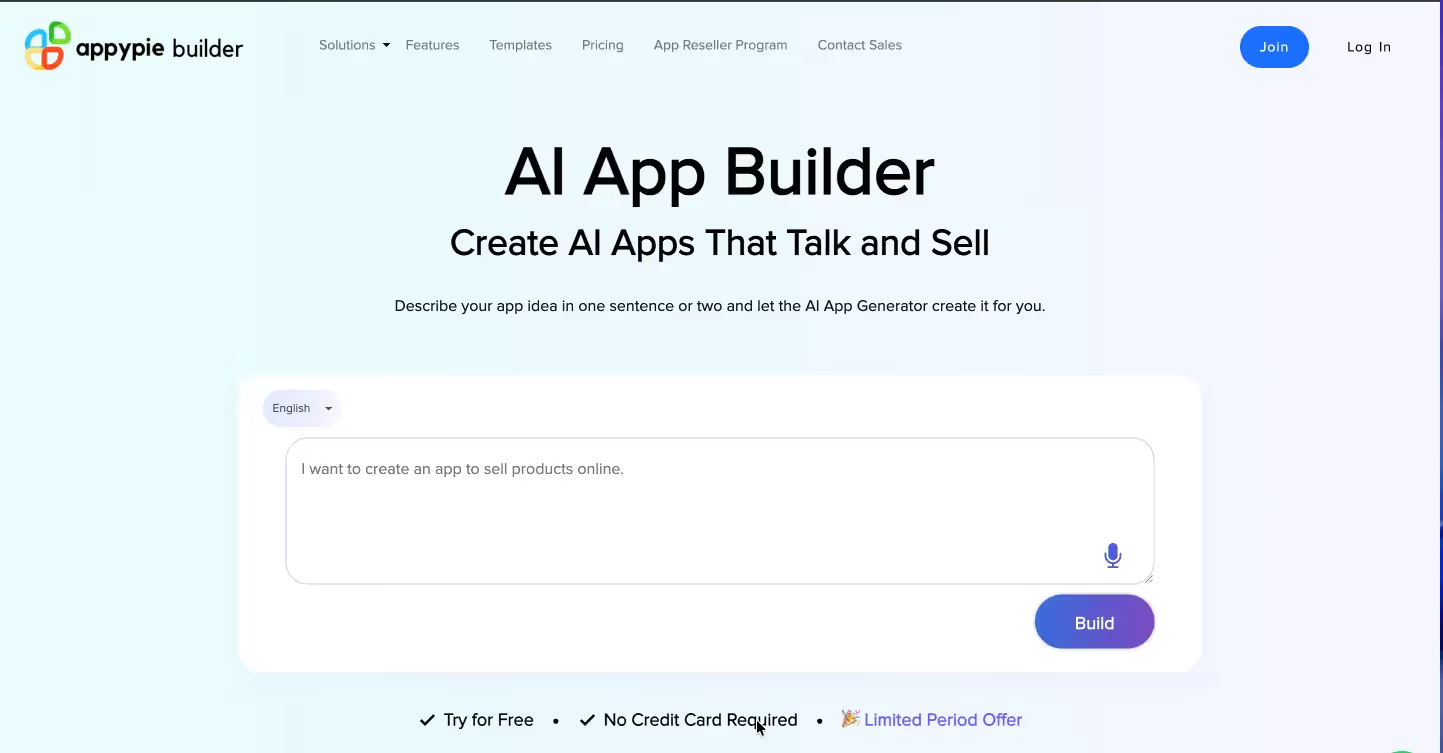
Appy Pie's AI app generator transforms text or voice prompts into mobile and web applications suitable for entrepreneurs and small businesses needing quick deployment across platforms.
Key Features:
Natural language processing accepts detailed descriptions converting ideas into functional app structures. The platform handles iOS, Android, and web applications from single prompts, eliminating platform-specific development.
Template customization provides starting points across industries—restaurants, retail, healthcare, and services. Users describe modifications and the AI adjusts layouts, features, and branding accordingly.
Drag-and-drop refinement follows AI generation, letting users manually adjust components the AI created. This hybrid approach balances automation with control for specific requirements.
Limitations:
Template-based architecture limits deep customization compared to platforms offering pixel-perfect design control. Apps follow predefined patterns with modest variation possibilities.
Pricing tiers required for native app publishing mean free plans restrict full deployment capabilities. Advanced features need paid subscriptions.
Best For: Small businesses needing multi-platform presence quickly, entrepreneurs testing app ideas, teams prioritizing speed over deep customization.
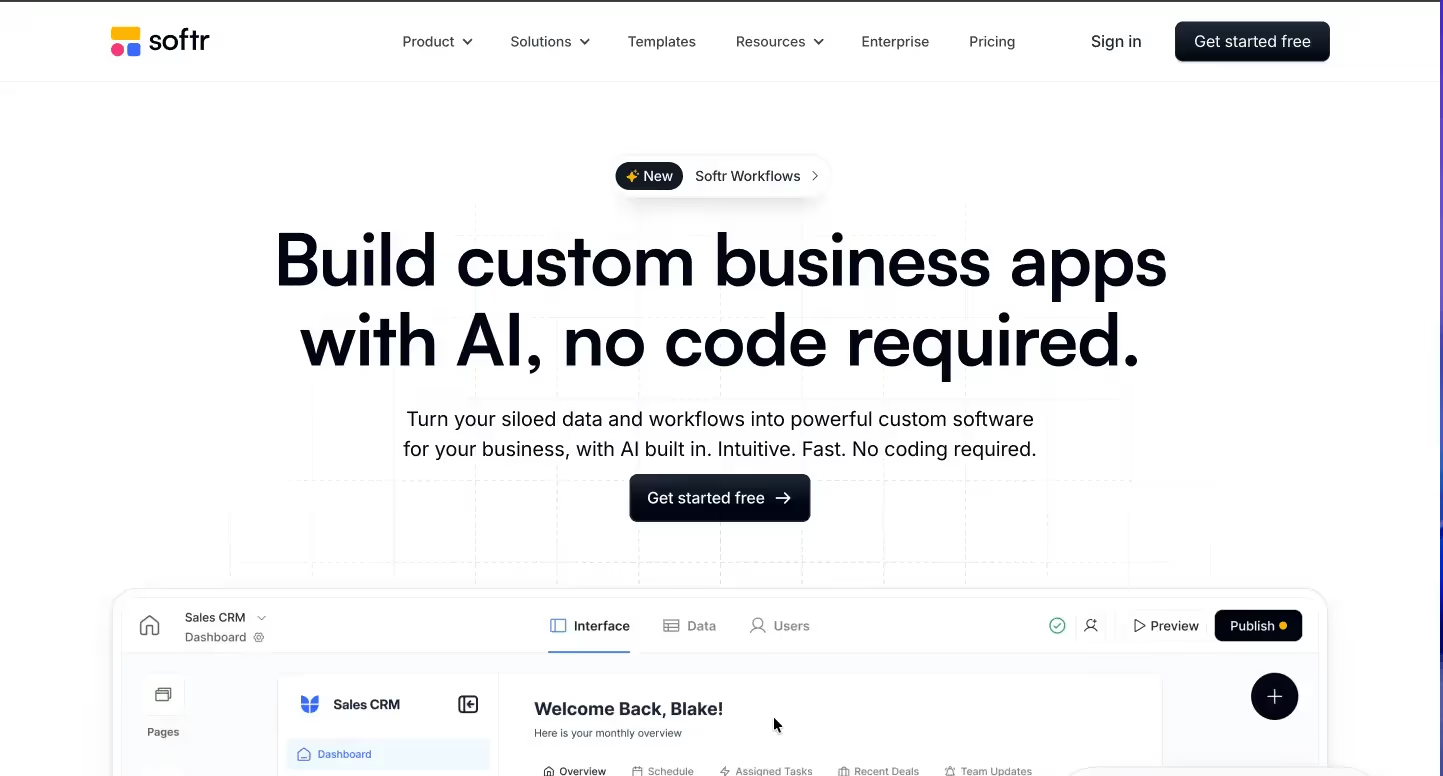
Softr excels at generating client portals, membership sites, and internal tools from existing Airtable or Google Sheets data using AI prompts describing desired functionality.
Key Features:
AI-powered design accepts 200-word prompts describing app appearance and functionality. The platform generates complete interfaces with buttons, forms, and navigation in seconds.
Data-aware applications automatically connect to spreadsheet structures, creating CRUD operations (create, read, update, delete) without manual configuration. Changes in data sources reflect instantly in applications.
Server-side security provides SOC 2 compliance with role-based permissions and record-level access control—critical for client-facing portals managing sensitive information.
Limitations:
Primarily frontend-focused means complex backend logic requires external automation tools or custom development. The platform optimizes for data display rather than sophisticated processing.
Airtable ecosystem emphasis delivers best results when using Airtable as the data source. While Google Sheets works, some features shine brightest with Airtable.
Best For: Agencies building client portals quickly, businesses with existing Airtable databases, teams creating membership communities, organizations needing secure data access controls.
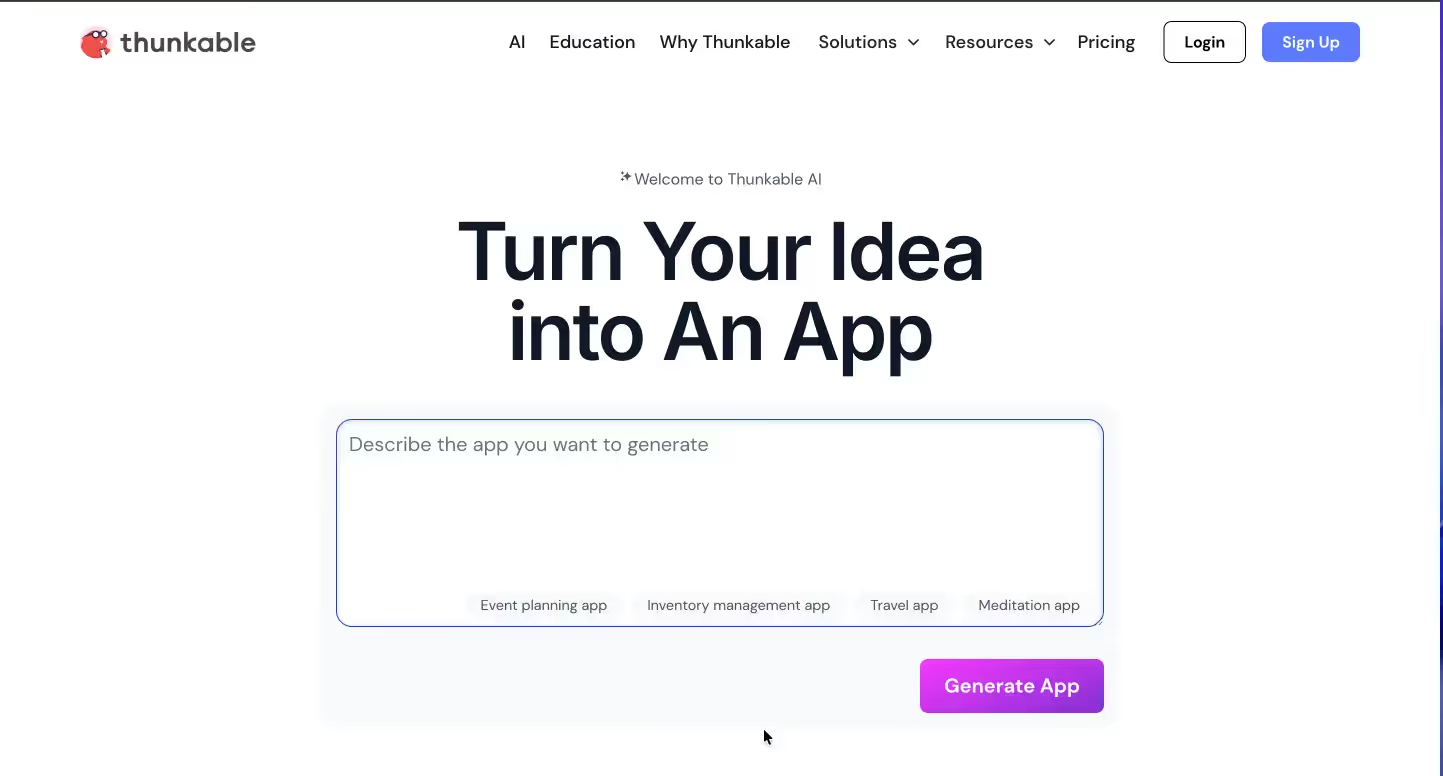
Thunkable specializes in native mobile app creation for iOS and Android using conversational AI assistance combined with visual block-based logic building accessible to beginners.
Key Features:
AI-assisted component generation suggests appropriate UI elements based on app descriptions. The platform recommends buttons, forms, lists, and navigation patterns matching your requirements.
Cross-platform development builds once and deploys to both iOS and Android simultaneously, eliminating duplicate effort for platform-specific applications.
Generative AI capabilities implement features like chatbots, content generation, and smart recommendations through simple natural language instructions describing desired AI behaviors.
Real-device testing through Thunkable Live app allows immediate testing on actual phones during development, providing authentic user experience feedback before publishing.
Limitations:
Design flexibility less extensive than native development tools. Complex custom interfaces may exceed platform capabilities requiring alternative solutions.
Free and starter tiers restrict app store publishing, requiring paid plans for full deployment to Apple App Store and Google Play Store.
Best For: Educators teaching app development, beginners exploring mobile creation, rapid prototyping of mobile concepts, teams building cross-platform mobile apps.
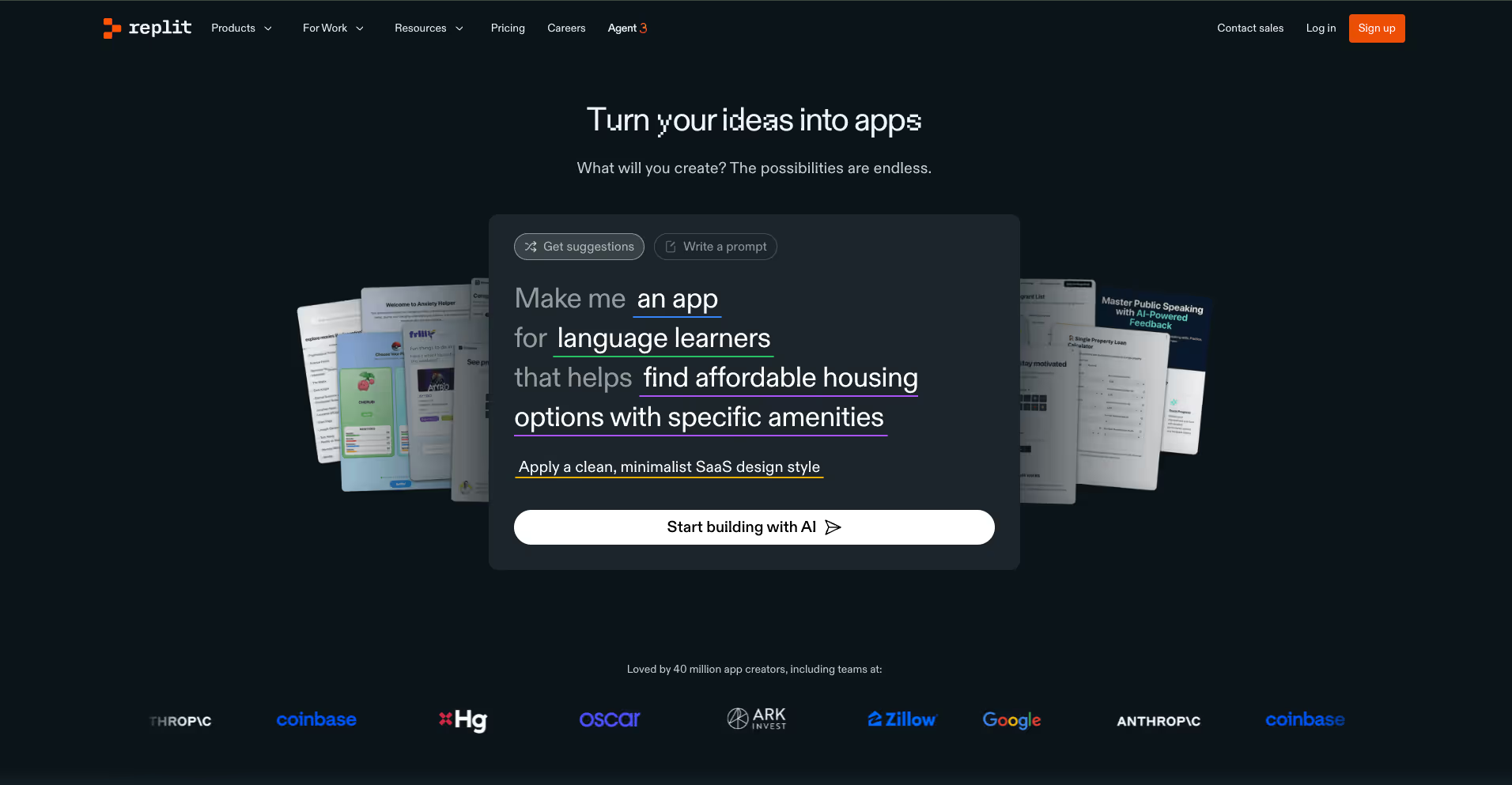
Replit Agent generates complete working applications including frontend, backend, and database from conversational prompts, delivering actual code that developers can modify and export.
Key Features:
End-to-end generation creates entire application stacks—user interfaces, server logic, database schemas, and API endpoints—from single detailed prompts describing functionality.
Built-in hosting through Replit Deployments eliminates separate deployment configuration. Applications go live instantly with autoscaling capabilities handling traffic increases automatically.
Cloud services integration provides databases, object storage, and environment variables natively. No external AWS or Firebase setup needed for basic applications.
Collaborative development supports real-time multiplayer editing where teams work simultaneously on generated code, reviewing and modifying AI output together.
Limitations:
Code maintenance responsibility falls on developers. Unlike component-based platforms, you inherit generated code requiring ongoing maintenance, security updates, and bug fixes.
Educational focus means Replit optimizes for learning and experimentation. Production applications may need additional hardening and optimization beyond initial AI generation.
Best For: Developers wanting AI-accelerated coding, technical teams needing exportable code, educational environments teaching full-stack development, startups rapidly prototyping technical concepts.
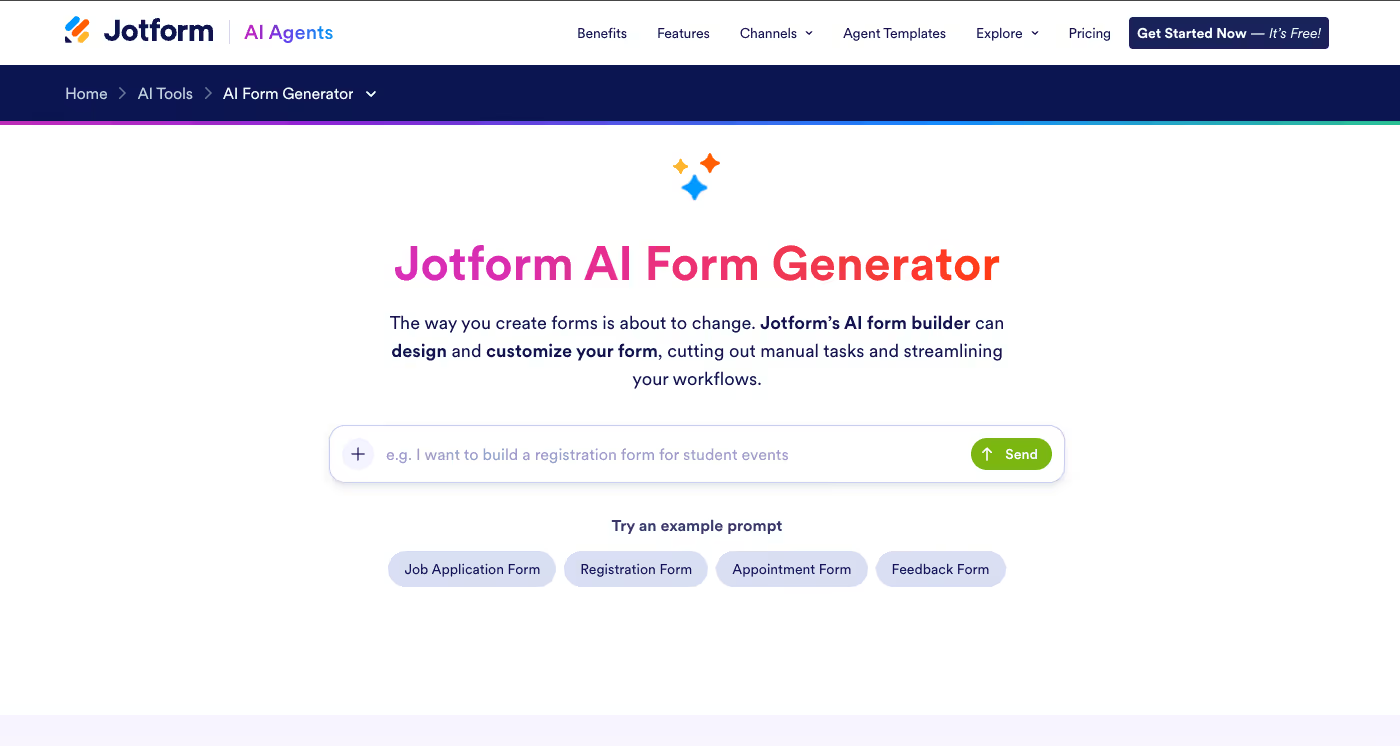
Jotform's AI generator creates apps centered around data collection forms, surveys, and workflows, extending beyond traditional form builders into full application territories.
Key Features:
Text-to-app conversion accepts descriptions of data collection needs and generates appropriate forms, logic, and workflows. The AI understands field types, validation rules, and conditional logic from natural language.
Extensive form capabilities include payment collection, appointment scheduling, e-signatures, and conditional branching—features essential for business process applications beyond simple surveys.
HIPAA compliance options suit healthcare applications managing protected health information. Enterprise plans provide necessary security certifications for regulated industries.
Multi-step application creation generates complex workflows with conditional paths, approval stages, and automated notifications based on submission data.
Limitations:
Form-centric architecture means applications center around data collection rather than broader app types like dashboards, analytics, or content platforms.
AI features limited to certain plan tiers require paid subscriptions for full AI agent capabilities and advanced generation features.
Best For: Organizations needing sophisticated data collection, healthcare providers requiring HIPAA compliance, businesses building approval workflows, teams managing client intake processes.
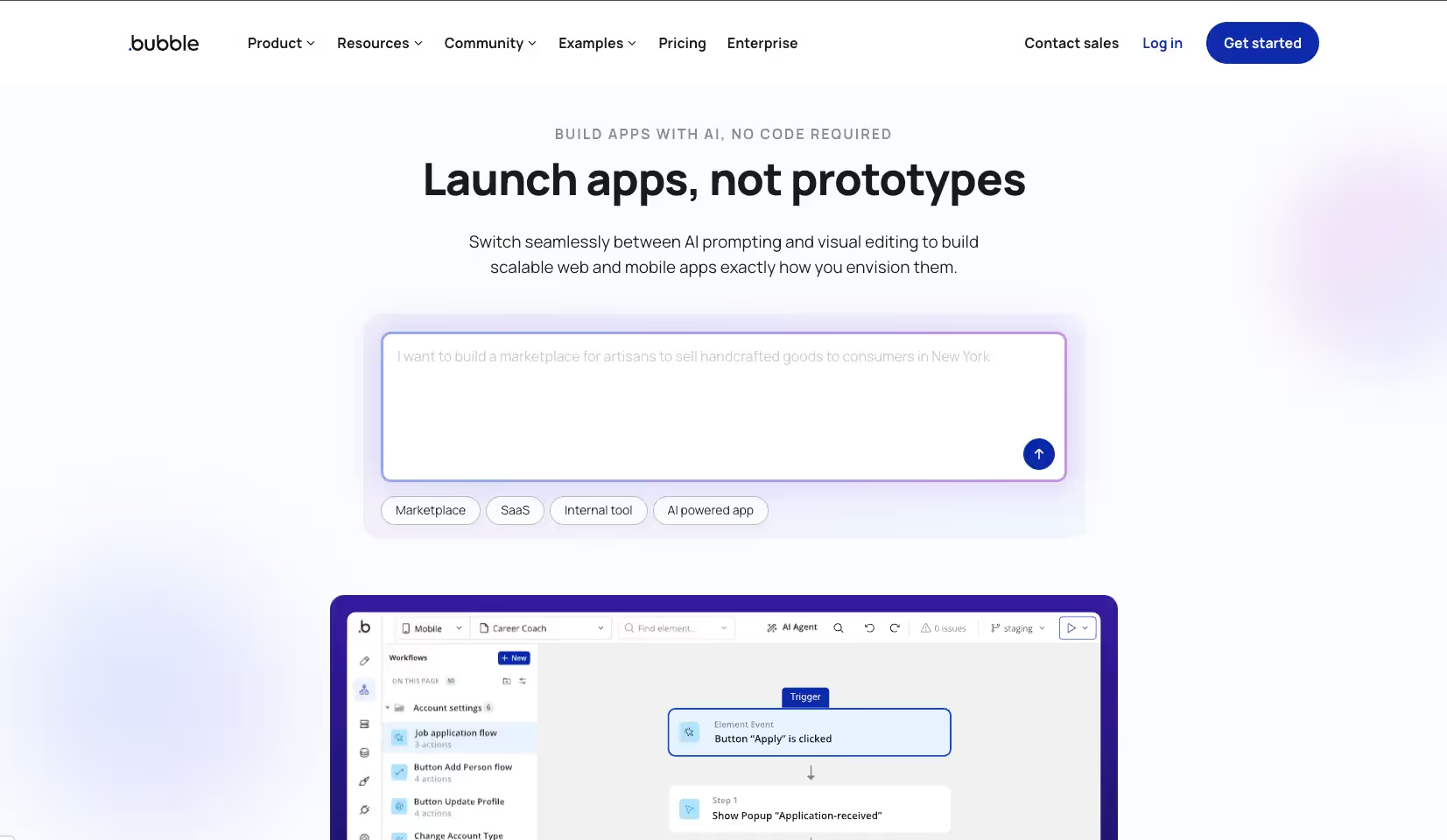
Bubble leverages AI to accelerate building sophisticated web applications while maintaining full control over databases, workflows, and design through its established no-code platform.
Key Features:
AI-assisted development speeds up element creation, workflow design, and database schema through prompts suggesting optimal structures for described functionality.
Complete database management provides full control over data models, relationships, and queries. Unlike spreadsheet-based builders, Bubble offers true relational database capabilities.
Extensive plugin marketplace extends functionality with thousands of community and official plugins adding specialized features, third-party integrations, and advanced capabilities.
Pixel-perfect design control allows exact interface specifications without template restrictions. Designers achieve precise brand alignment and unique user experiences.
Limitations:
Steep learning curve compared to simpler AI builders. Non-technical users often require significant training before productive app building.
Web-only focus means native mobile apps need additional tools or wrappers. Direct app store publishing requires third-party solutions.
Performance optimization necessary for complex applications. Poor database design or workflow structure can create sluggish user experiences requiring technical expertise to resolve.
Best For: Technical founders building SaaS products, teams requiring complex business logic, applications needing extensive customization, developers comfortable with learning curves.
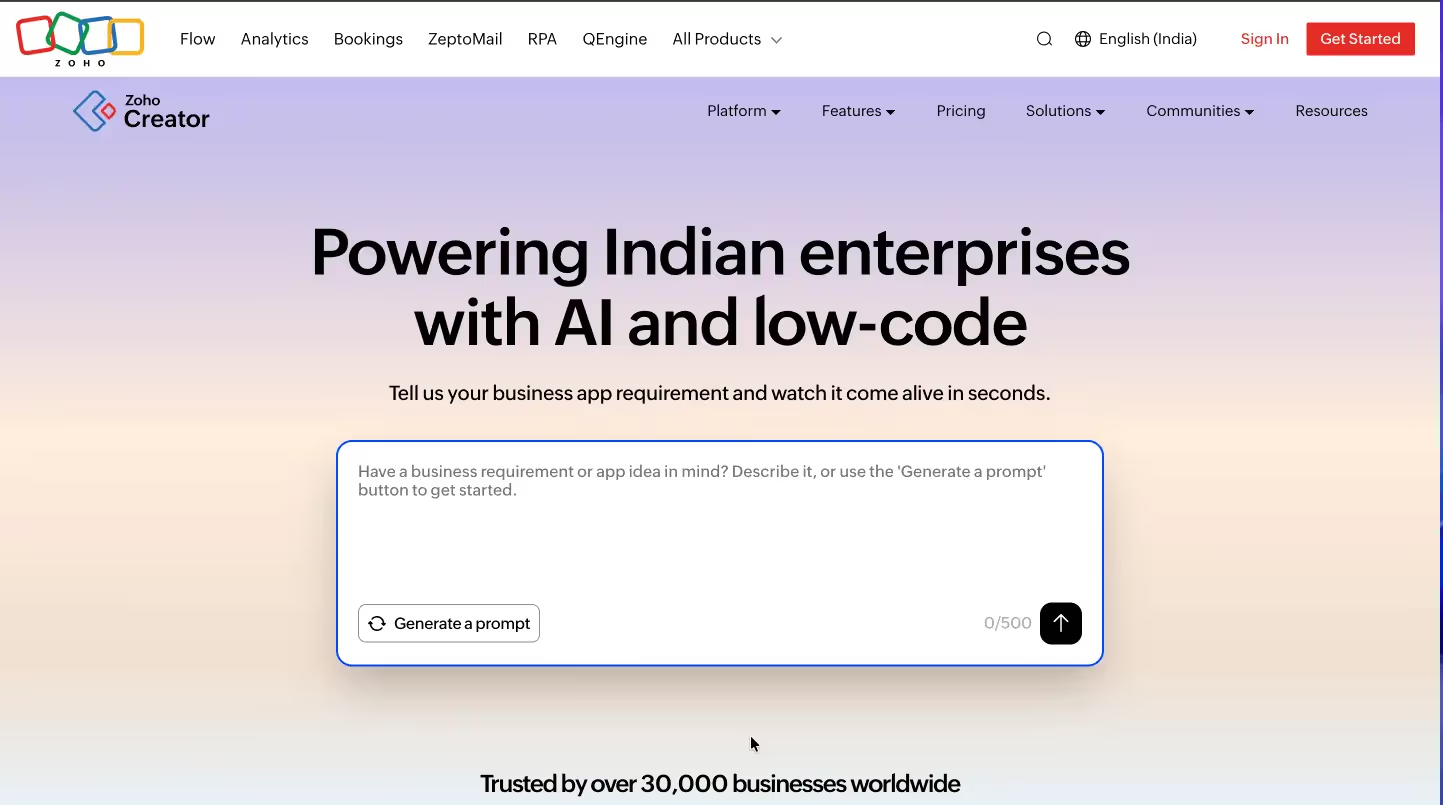
Zoho Creator combines AI-powered app generation with enterprise-grade security, reporting, and integration capabilities suited for large organizations with established Zoho ecosystems.
Key Features:
AI-driven app suggestions analyze described requirements and recommend appropriate app structures, fields, and workflows matching enterprise patterns and best practices.
Comprehensive reporting generates dashboards, charts, and analytics automatically based on collected data. The AI suggests relevant metrics and visualizations for business insights.
Zoho ecosystem integration connects seamlessly with Zoho CRM, Mail, Campaigns, and dozens of other Zoho applications, providing unified business process automation.
Enterprise security includes role-based access, audit trails, data encryption, and compliance certifications meeting stringent organizational requirements.
Limitations:
Zoho ecosystem optimization means best results require using other Zoho services. Standalone use possible but doesn't leverage full platform advantages.
Complex pricing structure with multiple add-ons and user tiers can make cost prediction challenging for growing organizations.
Best For: Enterprises using Zoho products, organizations requiring enterprise security and compliance, businesses building complex workflow applications, teams needing advanced reporting and analytics.
Several factors differentiate these AI prompt-based builders beyond basic app creation functionality.
Native mobile deployment separates platforms like Clappia, Appy Pie, and Thunkable (offering true app store publishing) from web-focused solutions requiring wrappers or producing only progressive web apps.
Code vs. components represents fundamental architectural differences. Code generators (Replit, Bubble) produce code you maintain; component platforms (Clappia, Softr) use pre-built elements maintained by platform teams.
Offline functionality matters for field operations and areas with unreliable connectivity. Clappia's offline capabilities and automatic synchronization surpass most alternatives lacking robust offline support.
Pricing models range from per-user (Glide, Zoho), per-app (Appy Pie), to unlimited apps with user limits (Clappia). Understanding cost structures prevents budget surprises during scaling.
Industry specialization influences feature sets. Platforms like Clappia optimize for operational and field service applications, while Jotform excels at data collection and Softr targets client portals.
Selecting the right AI prompt-based app builder depends on specific project requirements and organizational constraints.
For component-based safety without code exposure, Clappia's architecture eliminates security vulnerabilities while maintaining full customization through professionally developed components. The free unlimited apps plan provides exceptional testing opportunities.
For rapid form-based apps with payment processing and scheduling, Jotform's AI generator delivers specialized capabilities for data collection workflows beyond general app builders.
For client portals from existing data, Softr's AI quickly transforms Airtable or Google Sheets into polished, secure applications with minimal configuration effort.
For cross-platform mobile apps with educational resources, Thunkable balances AI assistance with accessible block-based logic suitable for beginners and educators.
For exportable code developers can modify, Replit Agent generates full-stack applications providing code ownership and customization freedom beyond visual platform limitations.
For enterprise workflows within Zoho ecosystems, Zoho Creator delivers AI-powered app building with enterprise security, reporting, and seamless integration across Zoho services.
For complex web applications requiring pixel-perfect design, Bubble's AI-assisted development provides maximum flexibility despite requiring greater technical investment.
Most platforms offer free plans or trials allowing hands-on evaluation before committing to paid subscriptions.
Define requirements clearly before testing. List essential features—native mobile apps, offline functionality, specific integrations, workflow automation—helping filter platforms quickly based on capabilities rather than marketing promises.
Test prompt comprehension by describing your application needs to each platform's AI. Quality varies significantly; some understand complex requirements immediately while others need multiple clarification rounds.
Evaluate post-generation editing since AI rarely produces perfect first attempts. Platforms providing intuitive modification interfaces reduce frustration during inevitable adjustments and refinements.
Consider long-term maintenance implications. Code-generation platforms require ongoing technical expertise for security updates and bug fixes. Component platforms handle maintenance automatically, freeing teams to focus on business logic rather than infrastructure.
Explore Clappia AI's capabilities with free unlimited apps supporting 100 users. The component-based approach eliminates code maintenance while delivering native mobile apps with advanced field operations features.
 Get Started – It’s Free
Get Started – It’s Free
L374, 1st Floor, 5th Main Rd, Sector 6, HSR Layout, Bengaluru, Karnataka 560102, India

3500 S DuPont Hwy, Dover,
Kent 19901, Delaware, USA


3500 S DuPont Hwy, Dover,
Kent 19901, Delaware, USA

L374, 1st Floor, 5th Main Rd, Sector 6, HSR Layout, Bengaluru, Karnataka 560102, India






